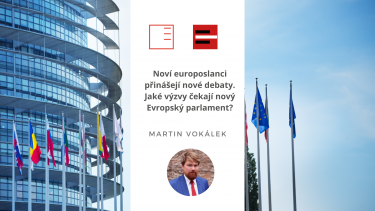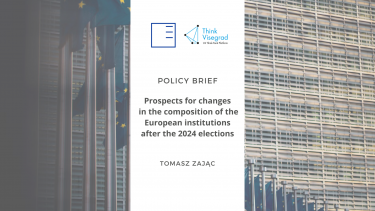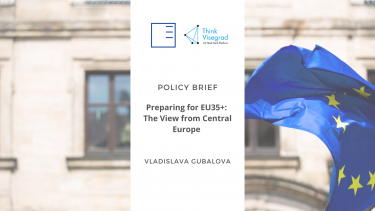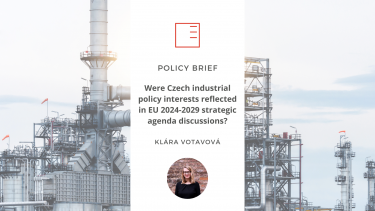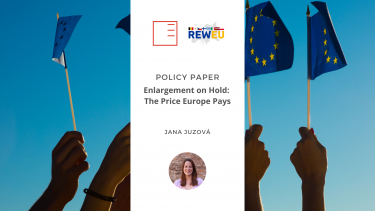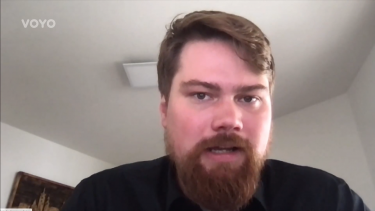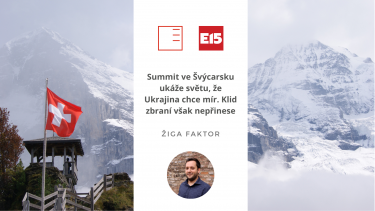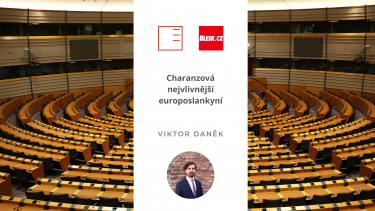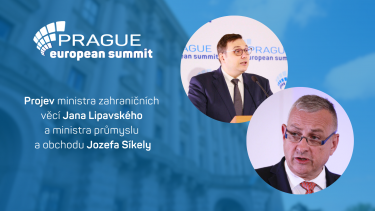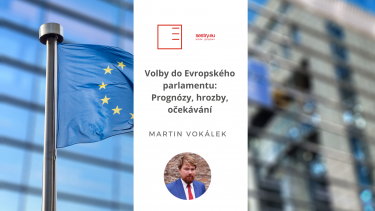Czech Radio | New MEPs bring new debates. What challenges await the new European Parliament?
According to the Executive Director of EUROPEUM Institute Martin Vokálek European topics will be more frequently discussed in the public sphere. The reason for this are the newly elected MEPs, who met for the first time this week at a plenary session in Strasbourg. Their ranks include not only "traditional" politicians but also prominent figures with unconventional approaches. What challenges and changes can we expect from the new European Parliament? Listen to the Czech Radio podcast Bruselské chlebíčky.
Show more
Policy Brief | Prospects for changes in the composition of the European institutions after the 2024 elections
This policy brief analyses the prospective changes in the European Parliament (EP) composition following the 2024 elections. It reflects on the evolving political environment since 2019, highlighting shifts in party dynamics within the EP, such as the fragmentation of traditional party dominance and the emergence of new political alignments. Additionally, it explores potential reconfigurations in top EU positions post-elections and examines ongoing concerns regarding geographical representation within EU institutions, particularly the European Commission. Writes Tomasz Zając from the Polish Institute of International Affairs (PISM).
Show morePolicy Brief | Preparing for EU35+: The View from Central Europe
Despite the historical support of EU enlargement policy by the Visegrad Four (V4), these Central European states are now faced with the challenge of reconciling their stances with the new realities of the process. As Ukraine and Moldova opened their accession negotiations, the EU seems to be torn on the questions associated with the future enlargement(s) - institutional reforms and changes within the EU budget. Transitioning from economic beneficiaries to potential contributors, the V4 states must evaluate the potential political and economic impacts of new members on both the EU and their domestic levels. Writes and proposes recommendations Vladislava Gubalova from GLOBSEC.
Show morePolicy Brief | Were Czech industrial policy interests reflected in EU 2024-2029 strategic agenda discussions?
In light of the recent return of industrial policy to the global and EU stage, this policy brief outlines how Czech interests in this policy were reflected in the debates leading up to the adoption of 2024-2029 EU strategic agenda. First, it strives to define Czech industrial policy interests, outlining two alternative approaches to how they can be perceived. The liberal approach follows the long established consensus, according to which Czechia – as a very open, export oriented economy – should promote above all a seamless Single Market and free trade. Writes EUROPEUM Institute researcher Klára Votavová in her Policy Brief.
Show morePolicy Paper | Enlargement on Hold: The Price Europe Pays
How can the EU enlargement process regain its lost momentum? And how can we learn from previous rounds of enlargement? These questions are answered by a group of authors together with EUROPEUM Institute senior researcher Jana Juzová in a new publication within the REWEU project.
Show moreTV Nova | Distribution of factions in the European Parliament
After the European Parliament elections, the elected national political parties have to split into different factions. This process is ongoing, with question marks surrounding the ANO party. Martin Vokálek, Executive Director of EUROPEUM Institute, commented for TV Nova.
Show more
e15 | Summit in Switzerland will show the world that Ukraine wants peace. But it will not bring it
The luxury Alpine hotel Bürgenstock on the shores of Lake Lucerne in Switzerland will host the largest peace conference on Ukraine to date this coming weekend. Leaders and diplomats from nearly 90 countries will be there to seek ways to end the worst armed conflict in Europe since the Second World War. The ambitious event has been accompanied by criticism over the non-participation of Russia, China and US President Joe Biden. Even so, experts say the summit could be an important first step towards peace. Žiga Faktor, deputy director and head of the Brussels office of EUROPEUM Institute, describes the possibilities the conference will offer for e15 journal.
Show more
Blesk.cz | Charanzová the most influential MEP
The European Parliament has been mentioned a lot lately. However, this institution, which is far away from the Czechs, will undergo a transformation in the June elections. The EUROPEUM Institute has prepared a ranking of the influence of MEPs based on a survey of selected experts and stakeholders in European politics. Viktor Daněk, Deputy Director of EUROPEUM Institute, describes the ranking in more detail.
Show morePrague European Summit | "Nuclear energy must be part of the Green Deal." Ministers Lipavský and Síkela presented their priorities for the next European Commis
Minister of Foreign Affairs Jan Lipavský and Minister of Industry and Trade Jozef Síkela delivered speeches at the 10th anniversary of the Prague European Summit. Both responded to the ever-changing challenges facing Europe and Russia's expanding aggression, while Minister Síkela stressed the need of economical transformation.
Show moreSestry.eu | European Parliament Elections: Forecasts, Threats, Expectations
The elections to the European Parliament, which are taking place place from June 6 to 9, could bring significant changes to the EU's political scene. Polls suggest that there could be a strengthening of right-wing and populist parties, which could weaken current support for Ukraine and bolster Eurosceptic and pro-Russian positions. Martin Vokálek, director of EUROPEUM Institute, commented for the Ukrainian server Sestry.eu.
Show more
Staroměstské náměstí 4/1
Prague 1 - Staré Město
110 00
tel.: +420 212 246 552
email: europeum@europeum.org
https://www.europeum.org
